The politics of Croatia are defined by a parliamentary, representative democratic republic framework, where the Prime Minister of Croatia is the head of government in a multi-party system. Executive power is exercised by the Government and the President of Croatia. Legislative power is vested in the Croatian Parliament. The Judiciary is independent of the executive and the legislature. The parliament adopted the current Constitution of Croatia on 22 December 1990 and decided to declare independence from Yugoslavia on 25 May 1991. The Constitutional Decision on the Sovereignty and Independence of the Republic of Croatia came into effect on 8 October 1991. The constitution has since been amended several times. The first modern parties in the country developed in the middle of the 19th century, and their agenda and appeal changed, reflecting major social changes, such as the breakup of Austria-Hungary, the Kingdom of Serbs, Croats and Slovenes, dictatorship and social upheavals in the kingdom, World War II, the establishment of Communist rule and the breakup of the SFR Yugoslavia.

The Scottish Parliament is the devolved unicameral legislature of Scotland. Located in the Holyrood area of the capital city, Edinburgh, it is frequently referred to by the metonym Holyrood.

The Croatian Parliament or the Sabor is the unicameral representative body of the citizens of the Republic of Croatia; it is Croatia's legislature. Under the terms of the Croatian Constitution, the Sabor represents the people and is vested with legislative power. The Sabor is composed of 151 members elected to a four-year term on the basis of direct, universal and equal suffrage by secret ballot. Seats are allocated according to the Croatian Parliament electoral districts: 140 members of the parliament are elected in multi-seat constituencies, 8 from the minorities and 3 from the Croatian diaspora. The Sabor is presided over by a Speaker, who is assisted by at least one deputy speaker.
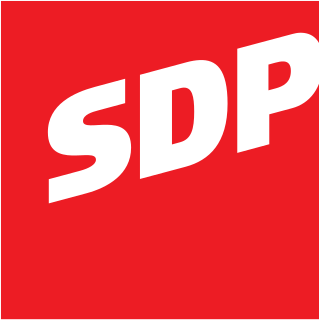
The Social Democratic Party of Croatia is a social-democratic political party and the largest party of the Croatian centre-left. The SDP is one of the two major political parties in Croatia, along with the centre-right Croatian Democratic Union (HDZ).

The Croatian Social Liberal Party is a conservative-liberal political party in Croatia. The HSLS was formed in 1989 as the first Croatian political party formed after the reintroduction of multi-party system.

The Civic Democratic Party is a liberal-conservative political party in the Czech Republic. It holds 25 seats in the Chamber of Deputies, and is the second strongest party following the 2017 election.
A dominant-party system, or one-party dominant system, is a system where there is "a category of parties/political organisations that have successively won election victories and whose future defeat cannot be envisaged or is unlikely for the foreseeable future." Many are de facto one-party systems, and often devolve into de jure one-party systems. Usually, the dominant party consistently holds majority government, without the need for coalitions.
Regular elections in Croatia are mandated by the Constitution and legislation enacted by Parliament. The presidency, Parliament, county prefects and assemblies, city and town mayors, and city and municipal councils are all elective offices. Since 1990, five presidential elections have been held. During the same period, nine parliamentary elections were also held. In addition, there were six nationwide local elections. Croatia has held two elections to elect 11 members of the European Parliament following its accession to the EU on 1 July 2013.

Brecon and Radnorshire is a county constituency of the House of Commons of the Parliament of the United Kingdom. Created in 1918, it elects one Member of Parliament (MP) by the first past the post system of election; until 1997 its name was simply Brecon and Radnor.
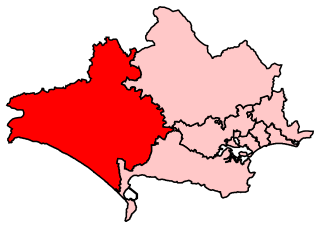
West Dorset is a constituency represented in the House of Commons of the UK Parliament since 1997 by Sir Oliver Letwin, a Conservative.

Parliamentary elections were held alongside presidential elections in Croatia on 2 August 1992, the first after independence and under the new constitution. All 138 seats in the Chamber of Representatives were up for election. The result was a victory for the Croatian Democratic Union, which won an absolute majority of 85 seats. Voter turnout was 75.6%.
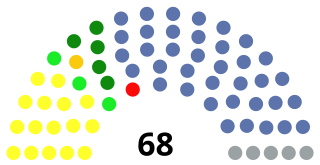
Chamber of Counties elections were held for the first time in Croatia on 7 February 1993. The result was a victory for the Croatian Democratic Union, which won 37 of the 63 elected seats.
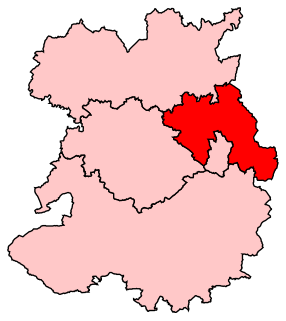
The Wrekin is a constituency in the House of Commons of the British Parliament, located in the county of Shropshire in the West Midlands of England. It has existed continuously since its creation by the Representation of the People Act 1918, and is named after a prominent landmark hill in the area, The Wrekin. The constituency has periodically swung back and forth between the Labour and Conservative parties since the 1920s, and has been held since 2005 by a Conservative MP, Mark Pritchard.
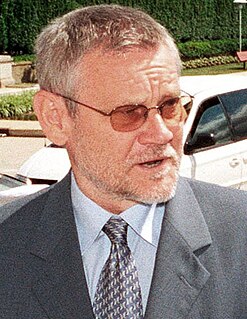
Parliamentary elections for the Chamber of Representatives of the Croatian Parliament were held on 3 January 2000. These were the first elections to be held after the expiration of a full 4-year term of the previous Chamber of Representatives.

The counties of Croatia are the primary administrative subdivisions of the Republic of Croatia. Since they were re-established in 1992, Croatia has been divided into 20 counties and the capital city of Zagreb, which has the authority and legal status of both a county and a city. As of 2015, the counties are subdivided into 128 cities and 428 municipalities.

The Seventh Government of the Republic of Croatia was the first of two Croatian Government cabinets led by Prime Minister Ivica Račan. It was appointed on 27 January 2000 by a decree of the Acting President of the Republic and Speaker of Parliament, Vlatko Pavletić. The cabinet was confirmed by a parliamentary vote of confidence in the Chamber of Representatives on 2 February 2000, with 122 of 151 Members of Parliament voting for, 1 against and 1 abstaining. Its term ended on 30 July 2002, when it was reconstructed and replaced by Cabinet of Ivica Račan II. The cabinet was formed following the 2000 parliamentary elections, in which the centre-right party Croatian Democratic Union (HDZ) was defeated by a broad coalition of several centre-left parties. This marked an end to HDZ's dominance in Croatian politics since the first multi-party election in 1990. However, the period under Prime Minister Račan was marred with constant disagreements among coalition members, which later led to some parties leaving the ruling coalition. This ultimately paved the way for HDZ's return to power in the 2003 parliamentary elections.

Parliamentary elections were held in Croatia on 8 November 2015. All 151 seats in the Parliament were up for election. This parliamentary election was the 8th since the first multi-party election in 1990 and the first since Croatia joined the European Union in 2013. The ruling center-left Croatia is Growing coalition, led by Prime Minister Zoran Milanović, was challenged by the center-right Patriotic Coalition led by the HDZ and headed by its party chairman Tomislav Karamarko, and also faced several new political coalitions.

Legislative elections were held in Romania on 9 December 2012. The Social Liberal Union of Prime Minister Victor Ponta won an absolute majority in both the Chamber of Deputies and the Senate. Despite the severe weather in parts of the country, the turnout was at 41.7%, higher than the last legislative elections held in 2008 which saw a presence of 39.20%.

The Bridge of Independent Lists is a political party in Croatia founded in 2012. The party is led by Božo Petrov, its founder and the former Mayor of Metković and Speaker of the Croatian Parliament from 14 October 2016 to 5 May 2017.






















